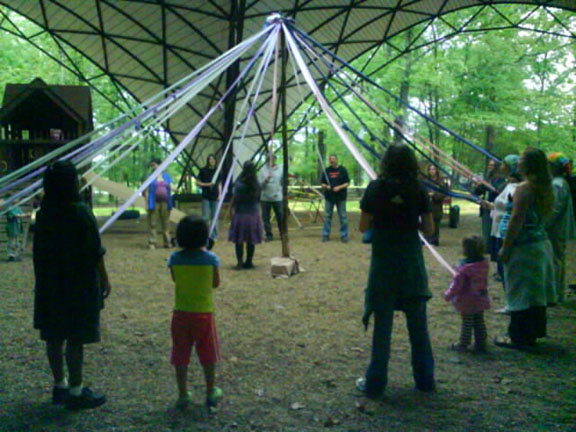For a time, I self-identified as a vegetarian, and then for many years, after I had incorporated fish and fowl back into my diet, I identified myself as someone who did not eat beef or pork. Then, shortly after the turn of the century, when I was doing a lot of foreign travel, I made a deliberate effort to start eating meat again. It was distasteful and kinda creepy at first, and on a few occasions, a mouthful of meat went back onto my fork rather than down my gullet after a bout of chewing because the texture threatened to invoke my gag reflex, but over time I worked my way up to the point where I could eat a steak and keep it down. I haven't put that to the test recently, but I'm pretty sure I could pass for normal at any sit-down meal with mainstream industrial eaters.
Why would I endure discomfort in order to adopt a less healthful diet; one that is harder on Gaia than was the vegetarian diet it replaced? Simply put, I never wanted to be an ungracious guest and reject home-cooked food that had been prepared for me. I cannot overstate the importance I place on food rituals and food traditions for creating and nurturing the bonds of community and family. I never made it to Provence or to any of the Mediterranean food havens, but I did partake fully of some home-cooked meals which, in an earlier dietary phase, I would have sampled selectively while rattling off my usual schpeel about grain fed to cattle and the correlation between meat consumption and heart disease. That's all good information, and I would like to see more people incorporate it into their understanding of how the world operates, but I've done my tour of duty spreading that gospel and repaying hospitality with indiscriminate ideological spillage and implied moral criticism. No more.
Earlier today, I followed a link from the Facebook page of a C-Realm listener to an essay by Daniel Vitalis in which he explains how he went from being a fervent vegan and raw foodie to someone who signed up for and attended a class in “hunter safety.” The first of the user comments included the following:
I am sure you are sincere, however how sustainable would it be for 7 billion people to eat wild animals? There are simply not enough to go around! In neanderthal times, it was perhaps appropriate however for today's world we cannot afford to continue eating any kind of meat. We are eating the planet to death. An environmentally conscious person would never recommend eating animal products for this reason, irrespective of whatever health benefits you claim from your animal diet.
Groan. Would that we could eat righteousness. I'm reminded of the interview I conducted with Colin Tudge, author of the book Feeding People is Easy.
Colin: Now a lot of people would draw a line there and say, “Well you can, in fact, feed people completely on plants,” that an all-plant diet is best, and that an all-plant diet is very efficient. And many people say, “We should just be vegetarians if we really want to feed ourselves.” And I say, and a lot of other people say, “No, this just isn’t actually true, because however much, however efficiently, you can farm just using plants, you can always farm even more efficiently if you put in some animals somewhere.”
And basically you break the animals down into two classes. There are those that eat grass and browse, which means the leaves of trees, and you can raise them on places where you wouldn’t normally be growing arable crops or horticulture; in other words cattle and sheep and things like that, you grow on grass in places including up mountains, where you can’t really practice arable farming and horticulture. And then in the places where you can practice arable farming and horticulture, you also have pigs and poultry which feed on the leftovers and surpluses and so on.
So if you are really trying to feed people well and provide a maximum amount of food easily, you finish up focusing on the arable, fit in the horticulture in the best places, and then you just fit in the animals where you can. If you do that, you finish up with a lot of plants, not much meat and maximum variety.”
Collin Tudge describes this style of feeding people as “Enlightened Agriculture.” I imagine ideologically-motivated vegetarians taking offense at that. To them eating animals probably seems about as “enlightened” as infanticide or counting coup, and I have no interest in disabusing them of that notion. My only interest here is to point out to you, my broad-minded reader, that people interested in feeding all of Gaia's humans and keeping them healthy and minimizing the toll that doing so takes upon Mother Earth will reject fundamentalist vegetarianism along with industrialized factory farming.
Given that I mostly practice, but do not endorse, vegetarianism, mine is a curious circumstance. At present, I'm living at the Ecovillage Training Center on the Farm in Summertown, Tennesse. The Farm was founded in the early 70's, and vegetarianism was one of the primary tenets of the shared belief system held by the original Farm residents. The goals and sensibilities of 21st Century, ecologically-informed, “enlightened agriculture” and 1970's Hippie idealism (to the extent that I understand either worldview) seem to co-exist happily in some places and to rub each other the wrong way in others. I see vegetarianism as a potential source of friction between the two worldviews.
This kitchen here at the ETC is a vegetarian kitchen (no meat allowed, though dairy and eggs are okay), and the food co-op which feeds me and the permaculture apprentices provides only vegetarian fare, and yet none of the people living on site here at the ETC are vegetarians. Most every time the apprentices and I seek a meal off the Farm, everyone takes the opportunity to grab a meat fix. Everyone but me.
Again, I'm not a vegetarian, and I do love the taste and texture of chicken, but I can't bring myself to order chicken that I know was raised under industrial conditions, so even when I leave the Farm, I maintain a de facto (but not an ideologically-motivated) vegetarian diet. While I love chicken, I also love chickens, and I suspect that my experience of keeping backyard chickens has highlighted the connection between the mental category 'chicken,' which refers to a standardized industrial food product that is measured by the pound, and the mental category 'chickens,' which matches up with an image of living domesticated birds.
Here at the ETC, we have four hens and one rooster. We keep the hens for egg production, and we keep the rooster for the hens. The Farm, on which the ETC is located, does not allow the raising of chickens for slaughter but does allow Farm residents to eat chicken. A cockerel who spends six months scratching in the dirt under the sky in a backyard flock, following his mother at first but quickly gaining confidence and striking out on his own to explore his environment, and then gets the ax after six months and, as Michael Pollan quips, “Has one bad day,” lives a sweet life compared to a cockerel raised for slaughter under industrial conditions. I won't dwell on the details. Suffice it to say that life for animals raised for slaughter at the human scale is much kinder than for animals raised at the industrial scale.
So long as humans continue to eat chickens, I want to see more of those chickens living their (admittedly short) lives at the human scale in backyard flocks and fewer of them suffering in factory farms. The ban on raising chickens for slaughter does the opposite. Every chicken raised in a factory and then purchased and consumed by someone prohibited from raising their own might have lived a kinder life but for the prohibition.
My point is not to criticize a particular policy of a particular community. I use it to illustrate the blowback that seems to accompany any effort to force people to conduct themselves with morality, decency and good sense. This is because people disagree about what constitutes morality, decency, and good sense. When faced with this sort of disagreement, people in positions of authority can try to persuade or try to mandate. Neither guarantees success. Requiring people to behave as if they believed what you believe, even when they don't, inevitably produces negative unintended consequences. Persuasion requires more time and attention than legislating morality, but it 's worth the effort.
I think. Maybe. Isn't it?
I sure hope so, because I don't want to live in a universe where forcing people to do what you want them to do really just does produce better outcomes than trying to win them over to your way of seeing things. Wouldn't that suck?







